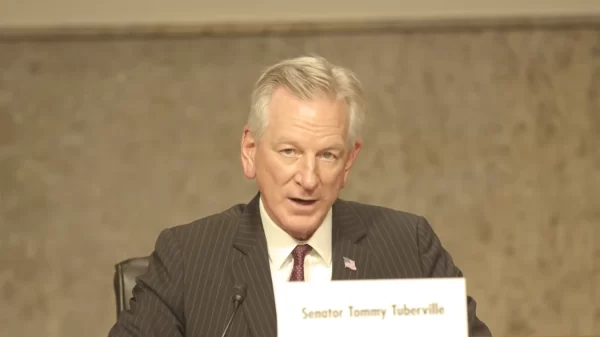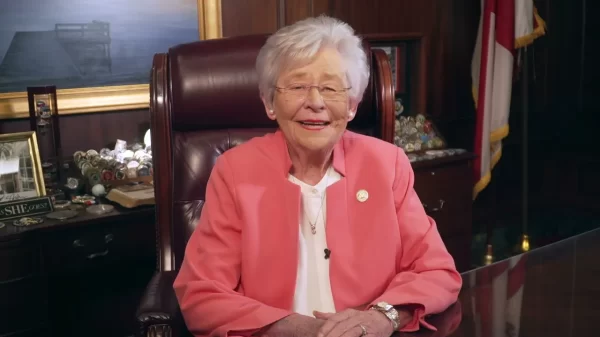When Alabama legislators passed a vaccine passport ban in May, it apparently had an unintended consequence: it forced pediatricians to accept unvaccinated children.
Kaycee Cavender and Stephanie Durnin, co-directors of Health Freedom Alabama, brought the issue Wednesday to a House committee meeting on Senate Bill 15, which passed the full Legislature late Thursday evening.
“When it originally passed in regular session, it impacted all vaccines and allowed families like mine to finally have access to healthcare,” Cavender told the committee. “You have to remove this language that makes this bill COVID-19 specific or it will deny thousands of children in Alabama access to routine healthcare.”
Indeed, a 2020 study commissioned by the CDC found that 51 percent of pediatric offices surveyed had policies to dismiss families if they refused vaccines in the primary series, while 28 percent had policies in place to dismiss families who “spread out” vaccines.
One such office is Fairhope Pediatrics, whose website states that patients refusing to follow American Academy of Pediatrics and CDC recommendations for vaccines will be dismissed.
“If despite our recommendations, you feel you cannot follow the AAP and CDC recommendations for these vaccines, we will ask you to find another health care provider who shares your views,” the policy reads “We do not keep a list of such providers, nor would we recommend any such providers. Please recognize that by not vaccinating, you are putting your child at unnecessary risk for life-threatening illness and disability, even death.”
The policy is dated Oct. 9, 2019, long before the vaccine passport ban became state law on May 24, 2021. The full policy can be read here.
Dr. Katrina Skinner, president of the Alabama chapter of AAP, is the primary pediatrician at Fairhope Pediatrics.
“My practice as well as others in the state are committed to an ongoing relationship with the family, but sometimes there are those rare circumstances when we are no longer able to find common ground on the importance of standard immunizations,” Skinner said. “Some pediatricians are concerned their established office policies are in conflict with the new law, thereby impacting their ability to provide the safest environment possible for all patients.”
Skinner emphasized the importance of vaccinations in the care of children.
“Childhood vaccinations have long been the standard of care in pediatric practice because they represent the most successful way to keep children healthy and free of disease,” Skinner said. “Routine childhood immunization is one of the crowning achievements in public health over the past century, preventing millions of cases of diphtheria, hepatitis A, measles, mumps, pertussis, polio and rubella. Pediatricians have an ethical and professional responsibility to keep every patient in their practice safe. Many pediatricians have instituted a stepwise approach to counseling families on the importance of recommended immunizations, and their decisions are based on keeping every patient healthy and safe, including other children who are exposed to one another in the practice (i.e. waiting area, etc.).”
Dr. Elizabeth Dawson, pediatrician at Charles Henderson Child Health Center, said her office does not have a policy on dismissing families, but explained the difficult position pediatric offices are in.
“The reason why they do that is we’re kind of in a unique spot,” Dawson said. “Imagine a child who has Leukemia with basically no immune system being in the waiting room. In a worst-case scenario, an unvaccinated child with measles comes in and that patient dies. Each office evaluates whether to take that risk.”
Dawson said the AAP had only recently advised its members that the dismissal of patients was a viable option.
The AAP seems to have altered its guidance in a September 2016 clinical report titled “Countering Vaccine Hesitancy.”
A report by Consultant360 summarizing the study quoted the authors as saying, “The decision to dismiss a family who continues to refuse immunization is not one that should be made lightly, nor should it be made without considering and respecting the reasons for the parents’ point of view.”
The report also outlined the AAP’s process for dismissing patients as a “last resort.”
- Dismissal must be in accordance with state laws on abandonment of patients.
- Parents or guardians should be officially notified and provided with information about finding a new physician.
- The office policy on vaccinations and dismissal should be clearly stated to the family.
- The pediatrician should make multiple attempts to educate the family before considering dismissal.
- The dismissing physician should continue treating the patient and providing emergency care for at least 30 days.
- If the pediatrician is in an area of the country with limited access to other primary care providers, dismissal of a patient could leave children without adequate health care. In such circumstances, the pediatrician should continue to provide care.
WHO called vaccine hesitancy a top 10 global threat in 2019.
But Alabama’s vaccine passport ban, which was primarily written with COVID-19 in mind, created a blanket ban on businesses requiring proof of any vaccination for service.
“An entity or individual doing business in this state may not refuse to provide any goods or services, or refuse to allow admission, to a customer based on the customer’s immunization status or lack of documentation that the customer has received an immunization,” the law reads.
It’s this language that has been construed to require pediatricians to accept children regardless of vaccination status.
So with the state law already set and decided, why were Cavender and Durnin bringing this issue before the Legislature at all?
A new bill sponsored by Sen. Arthur Orr, R-Decatur, had been amended by Senate Minority Leader Bobby Singleton, D-Greensboro, to include language limiting the passport ban to only refer to COVID-19 vaccinations, thus clearing the way for pediatricians to continue following their policies without running afoul of state law.
Orr voiced his opposition to the amendment on the floor, although he did not state on what grounds, and was joined by six other Republican senators in his disagreement. But the amendment passed 25-7 with other Republicans joining Democrats in supporting the amendment.
But that language was removed between the House committee meeting Wednesday afternoon and the bill’s introduction on the House floor Thursday afternoon. However, few comments were made about the change by lawmakers.
Efforts to reach Orr and Singleton for comment Monday were unsuccessful.
With the bill now signed into law, it appears pediatricians will remain required to provide services to children regardless of vaccination status.
“We’re caught in the middle somewhat trying to do what’s best for patients and families,” Dawson said. “It’s really a struggle for us as we are the main ones giving vaccines. Then to have the state say ‘Oh, you can’t even do that any more’ — it’s hard. It’s all gotten so politicized. We’re all about protecting patients and anyone who is not we’re going to stand up against them.”






















































